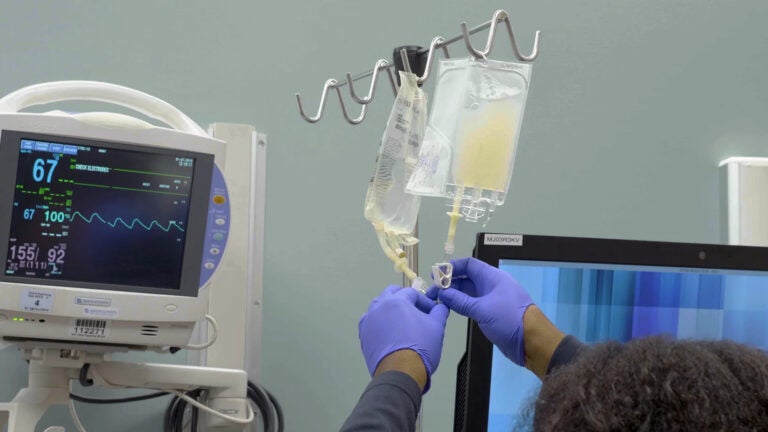Take note of these new health care laws coming to Pennsylvania, New Jersey and Delaware in 2025
State legislatures passed new laws on medical debt, cancer testing, insurance coverage and more. Some will kick in early in the new year.
Listen 1:07
File: In this January 2019 image made from video provided by Penn Medicine, IV bags of CRISPR-edited T cells are prepared for administering to a patient at the Abramson Cancer Center in Philadelphia. (Penn Medicine via AP)
From Philly and the Pa. suburbs to South Jersey and Delaware, what would you like WHYY News to cover? Let us know!
This past year, lawmakers in the tri-state area were focused on expanding access to maternal health support, strengthening consumer protections against medical debt, boosting access to mental health in schools and more.
Here are some new health care laws coming to Pennsylvania, New Jersey and Delaware that take effect in 2025.
Pennsylvania
Safe Haven laws
By Jan. 1, urgent care centers and health care providers will be included in the state’s Safe Haven law, which allows people to surrender a newborn child to public safety authorities and health care workers without punishment.
If people feel like they cannot care for a baby or don’t know where to seek help shortly after giving birth, they can leave their child with emergency services experts at police stations, EMS outposts, fire stations and hospitals.
As long as the baby is 28 days old or younger and has been unharmed, the person surrendering the child will not be criminally charged.
Medicaid coverage for doula care
Starting in early 2025, care provided by doulas during pregnancy and in the postpartum period will be covered under Medicaid, a public health insurance program for people with low incomes that is also known as Medical Assistance in Pennsylvania.
The new Medicaid coverage will more broadly apply to doulas who act as non-clinical professionals offering supportive services, guidance and education to mothers and families before, during and after birth.
The coverage expands on a law that took effect earlier in 2024, which first allowed doulas to work with certain organizations that oversee Medicaid services.
Biomarker cancer testing
All health insurance plans regulated by the state, including Medicaid, will be required to cover biomarker testing for cancer as of Jan. 1.
Biomarker testing examines samples of tissue, blood or other bodily fluids for certain genes, proteins and other substances that can give health care providers more detailed information about a patient’s cancer.
Health providers then consider these biomarkers or tumor markers as they make a personalized treatment plan for patients.
While treatment based on biomarker testing could lead to better outcomes, the testing hasn’t always been covered under insurance plans and it can be costly to pay for out of pocket.
That’s why advocates like Donna Greco, government relations director in Pennsylvania for the American Cancer Society Cancer Action Network, have fought to make biomarker testing a covered benefit under insurance plans.
“Biomarker testing really helps match patients with the right treatment at the right time,” Greco said, “saving them from having to go through ineffective courses of treatment that can also be very difficult physically and emotionally to go through, but also financially.”
Under the new law, insurance plans should cover biomarker testing when a doctor or health provider determines that it is medically necessary and beneficial for a patient’s treatment plan.
Some cancers do not have known biomarkers or tumor markers, so this kind of testing may not be necessary or helpful in those cases.
While biomarker testing will be added as a covered health care service, Greco said it doesn’t eliminate all costs. Patients may still need to cover deductibles, co-payments and other cost-sharing depending on their specific state, public or employer-sponsored insurance plan.
Most biomarker testing today applies to cancer and related treatment, but Greco said the new law leaves the door open for future coverage of biomarker testing for other diseases like sickle cell, rheumatoid arthritis, Alzheimer’s and more.
“[The law] absolutely brings Pennsylvanians more hope for survival, for improved quality of life as they’re seeking care and treatment and surviving cancer and other illnesses,” Greco said.
Perinatal and postpartum mental health education
The state Department of Health will be heading up an awareness and education campaign just before the start of summer about perinatal and postpartum depression and anxiety.
The department and health care providers will need to distribute information and resources to pregnant patients about pregnancy-related mood and anxiety disorders, as well as where they can go for help.
Up to 21% of pregnant women and new mothers experience perinatal mood and anxiety disorders, which can become serious if left untreated, according to national research.
Post-traumatic stress among emergency responders
By the end of October 2025, emergency responders like EMS providers, fire department workers, state police officers and peace officers will be eligible for workers’ compensation if they develop post-traumatic stress injury, also known as post-traumatic stress disorder.
Responders will be eligible if their stress comes from traumatic situations they’ve experienced or witnessed on the job, including serious injury, death, mass casualties, abused or exploited children, immediate threats to their lives and crime scenes under investigation.
An estimated 30% of emergency responders develop behavioral and mental health conditions as a result of their work, according to the Substance Abuse and Mental Health Services Administration.
Delaware
Mental health in schools
An expansion of mental health support programs and resources within the state’s school systems will continue into 2025 with new additions.
A plan to phase in changes over three years began at the end of fiscal year 2024 this past summer. A new law aims to establish mental health units staffed by experienced counselors, social workers and psychologists in all state high schools.
By the end of June 2025, schools must employ at least one full-time behavioral health professional for every 325 students. That ratio will tighten in fiscal year 2026 to one professional for every 250 students.
Abortion insurance coverage
A new law requires most private health insurance plans, state-regulated plans and Delaware’s Medicaid insurance program to cover abortions and related health care.
Health insurers are required to cover up to $750 for abortion services, which state lawmakers said should fully cover the cost of care for most patients.
There is an exemption for churches, religious businesses and employers to seek a waiver from the new requirements.
Insurance coverage for abortion begins Jan. 1 for people enrolled in Medicaid. Coverage for people with other types of health insurance plans will begin the following year, on Jan. 1, 2026.
New Jersey
Medical debt consumer protections
Parts of the Louisa Carman Medical Debt Relief Act already took effect this past summer, and more consumer protections are scheduled to kick in this coming July.
Right now, people in New Jersey who have unpaid bills and debt from hospital stays, health procedures and other kinds of care will not see their credit scores impacted as they figure out how to pay off their debt or dispute charges.
“Medical debt is incurred involuntarily, and it can result in exponential economic harms,” said Laura Waddell, health care program director at New Jersey Citizen Action. “So it wasn’t like, ‘Should we work on this?’ It was, ‘We have to work on this.’”
Debt collectors can no longer report a person’s medical debt to credit bureaus and agencies, which determine a person’s credit score. If someone’s score drops because of their medical debt, they may find it more difficult to secure a car loan, get approved for an apartment rental, apply for credit cards and even get a job.
If a bill collector does report a person’s medical debt to a credit bureau or agency in violation of the new state law, the amount of debt that is reported is voided, meaning, the patient will no longer have to pay it.
Beginning this July, all notices to patients about medical debt and billing must also notify them of their rights and new consumer protections. Interest on medical debt will be capped at 3% and debt collectors will be banned from using wage garnishment — when a portion of a person’s paycheck is withheld to pay off debt — for people earning up to 600% of the Federal Poverty Level, which is about $90,360 a year for a single person, or $187,200 for a family of four.
Waddell said the new consumer protections may not apply to people who are using medical credit cards to pay for services, copays and other charges (these are different from debit cards used for Health Savings Accounts).
Efforts to reduce the burdens of medical debt and regulate collection practices even more is ongoing, Waddell said.
“In the coming year, we want to try to bring more protections so that these aggressive debt collection practices, really try and curb some of those,” she said.
Postpartum health care planning
Later this spring, health care providers will be required to make a care plan with pregnant patients and new mothers for the postpartum period, which is a time after when women can experience complications after labor and delivery.
These postpartum care plans must include the review of future health care appointments; recommended testing or procedures for any ongoing health issues; guidance on the signs and symptoms of postpartum depression, anxiety and other mental health needs; breastfeeding support services; contraception options; and recommendations for other common postpartum health issues.
Plans and guidance must also be offered to patients who’ve experienced stillbirth and pregnancy loss.

Get daily updates from WHYY News!
WHYY is your source for fact-based, in-depth journalism and information. As a nonprofit organization, we rely on financial support from readers like you. Please give today.






